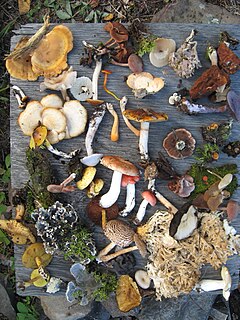
Sukkot, commonly translated as Feast of Tabernacles, known also as the Festival of Ingathering or in some translations the Festival of Shelters, is a biblical Jewish holiday celebrated on the 15th day of the seventh month, Tishrei. During the existence of the Jerusalem Temple, it was one of the Three Pilgrimage Festivals on which the Israelites were commanded to perform a pilgrimage to the Temple.

Biodiversity is the variety and variability of life on Earth. Biodiversity is typically a measure of variation at the genetic, species, and ecosystem level. Terrestrial biodiversity is usually greater near the equator, which is the result of the warm climate and high primary productivity. Biodiversity is not distributed evenly on Earth, and is richest in the tropics. These tropical forest ecosystems cover less than 10 percent of earth's surface, and contain about 90 percent of the world's species. Marine biodiversity is usually highest along coasts in the Western Pacific, where sea surface temperature is highest, and in the mid-latitudinal band in all oceans. There are latitudinal gradients in species diversity. Biodiversity generally tends to cluster in hotspots, and has been increasing through time, but will be likely to slow in the future.

In biology, extinction is the termination of a kind of organism or of a group of kinds (taxon), usually a species. The moment of extinction is generally considered to be the death of the last individual of the species, although the capacity to breed and recover may have been lost before this point. Because a species' potential range may be very large, determining this moment is difficult, and is usually done retrospectively. This difficulty leads to phenomena such as Lazarus taxa, where a species presumed extinct abruptly "reappears" after a period of apparent absence.

The acouchis are rodents belonging to the family Dasyproctidae from the Amazon basin. They are generally smaller than agoutis and have very short tails, while agoutis lack tails. For this reason the acouchis are also called tailed agoutis.

The IUCN Red List of Threatened Species, founded in 1964, is the world's most comprehensive inventory of the global conservation status of biological species. It uses a set of criteria to evaluate the extinction risk of thousands of species and subspecies. These criteria are relevant to all species and all regions of the world. With its strong scientific base, the IUCN Red List is recognized as the most authoritative guide to the status of biological diversity. A series of Regional Red Lists are produced by countries or organizations, which assess the risk of extinction to species within a political management unit.

Nepal, officially the Federal Democratic Republic of Nepal, is a landlocked country in South Asia. It is located mainly in the Himalayas, but also includes parts of the Indo-Gangetic Plain. With an estimated population of 26.4 million, it is 48th largest country by population and 93rd largest country by area. It borders China in the north and India in the south, east and west while Bangladesh is located within only 27 km (17 mi) of its southeastern tip and Bhutan is separated from it by the Indian state of Sikkim. Nepal has a diverse geography, including fertile plains, subalpine forested hills, and eight of the world's ten tallest mountains, including Mount Everest, the highest point on Earth. Kathmandu is the capital and the largest city. Nepal is a multiethnic country with Nepali as the official language.

Sturgeon is the common name for the 27 species of fish belonging to the family Acipenseridae. Their evolution dates back to the Triassic period some 245 to 208 million years ago. The family is grouped into four genera: Acipenser, Huso, Scaphirhynchus and Pseudoscaphirhynchus. Four species may now be extinct. Two closely related species, Polyodon spathula and Psephurus gladius are of the same order, Acipenseriformes, but are in the family Polyodontidae and are not considered to be "true" sturgeons. Both sturgeons and paddlefish have been referred to as "primitive fishes" because their morphological characteristics have remained relatively unchanged since the earliest fossil record. Sturgeons are native to subtropical, temperate and sub-Arctic rivers, lakes and coastlines of Eurasia and North America.

Skinks are lizards belonging to the family Scincidae and the infraorder Scincomorpha. With more than 1,500 described species, the Scincidae are one of the most diverse families of lizards. Common skinks include many different kinds such as the slender skink, snake-eyed skink and the skinks of the genus Plestiodon are among the common skinks.

A psilocybin mushroom also known as magic mushroom is one of a polyphyletic group of fungi that contain psilocybin and psilocin.
A namesake is a person, geographic location, building, or other entity named after another entity that first had the name, which is the eponym. It is normally the entity that's the later 'recipient' of the name, rather than the 'giver'.

Pokémon is a series of video games developed by Game Freak and published by Nintendo and The Pokémon Company as part of the Pokémon media franchise. First released in 1996 in Japan for the Game Boy, the main series of role-playing video games (RPGs), also referred as the "core series" by their developers, has continued on each generation of Nintendo's handhelds.

Wildlife conservation is the practice of protecting wild species and their habitats in order to prevent species from going extinct. Major threats to wildlife include habitat destruction/degradation/fragmentation, overexploitation, poaching, hunting, pollution and climate change. The IUCN estimates that 27,000 species of the ones assessed are at risk for extinction. Expanding to all existing species, a 2019 UN report on biodiversity put this estimate even higher at a million species. It's also being acknowledged that an increasing number of ecosystems on Earth containing endangered species are disappearing. To address these issues, there have been both national and international governmental efforts to preserve Earth's wildlife. Prominent conservation agreements include the 1973 Convention on International Trade in Endangered Species of Wild Fauna and Flora (CITES) and the 1992 Convention on Biological Diversity (CBD). There are also numerous nongovernmental organizations (NGO's) dedicated to conservation such as the Nature Conservancy, World Wildlife Fund, and Conservation International.
ARKive was a global initiative with the mission of "promoting the conservation of the world's threatened species, through the power of wildlife imagery", which it did by locating and gathering films, photographs and audio recordings of the world's species into a centralised digital archive. Its priority was the completion of audio-visual profiles for the c. 17,000 species on the IUCN Red List of Threatened Species.

Heterodonta is a taxonomic subclass of saltwater clams, marine bivalve molluscs. This subclass includes the edible clams, the cockles and the Venus clams.

The Convention on the Conservation of Migratory Species of Wild Animals, also known as the Convention on Migratory Species (CMS) or the Bonn Convention, is an international agreement that aims to conserve migratory species within their migratory ranges. The Agreement was signed under the auspices of the United Nations Environment Programme and is concerned with conservation of wildlife and habitats on a global scale.
In biogeography, a species is indigenous to a given region or ecosystem if its presence in that region is the result of only natural processes, with no human intervention. The term is equivalent to the concept of native or autochthonous species. Every wild organism has its own natural range of distribution in which it is regarded as indigenous. Outside this native range, a species may be introduced by human activity, either intentionally or unintentionally; it is then referred to as an introduced species within the regions where it was anthropogenically introduced.

The Catalogue of Life is an online database that provides the world's most comprehensive and authoritative index of known species of animals, plants, fungi and micro-organisms. It was created in 2001 as a partnership between the global Species 2000 and the American Integrated Taxonomic Information System. The Catalogue interface is available in twelve languages and is used by research scientists, citizen scientists, educators, and policy makers. The Catalogue is also used by the Biodiversity Heritage Library, the Barcode of Life Data System, Encyclopedia of Life, and the Global Biodiversity Information Facility. The Catalogue currently compiles data from 168 peer-reviewed taxonomic databases, that are maintained by specialist institutions around the world. As of 2019, the Catalogue lists 1,837,565 of the world's 2.2m extant species known to taxonomists on the planet at present time.

iNaturalist is a citizen science project and online social network of naturalists, citizen scientists, and biologists built on the concept of mapping and sharing observations of biodiversity across the globe. iNaturalist may be accessed via its website or from its mobile applications. Observations recorded with iNaturalist provide valuable open data to scientific research projects, conservation agencies, other organizations, and the public. The project has been called "a standard-bearer for natural history mobile applications."

Caprodon is a small genus of fish belonging to the subfamily Anthiadinae. It contains three species.
















